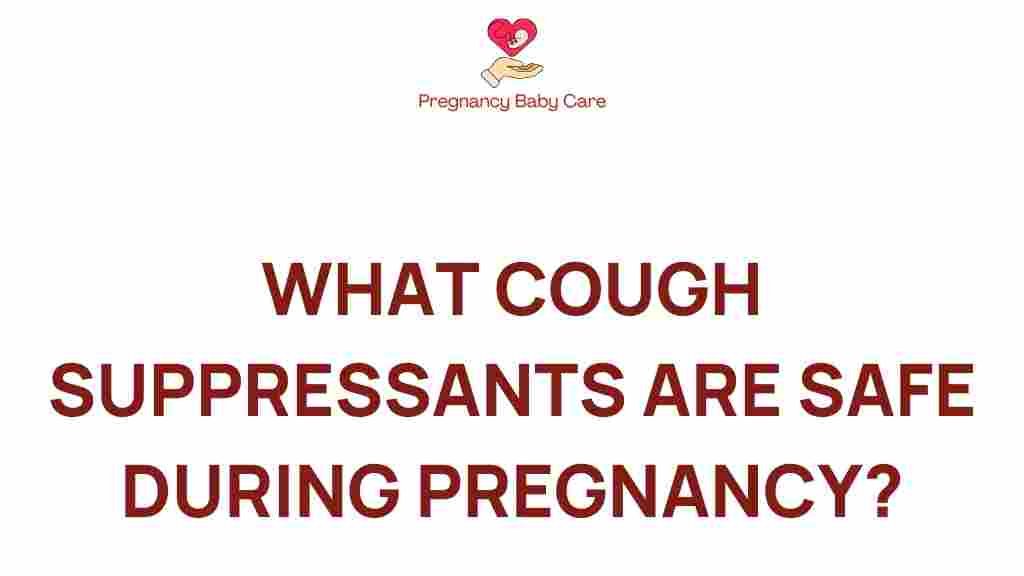Navigating Cough Suppressants: What’s Safe During Pregnancy?
Pregnancy is a time filled with excitement and anticipation, but it can also come with its share of discomforts, including coughs and colds. For expectant mothers, managing these ailments can be tricky, especially when it comes to medication. In this article, we will explore cough suppressants, focusing on pregnancy safety, and provide health tips for maternal health during this delicate time.
Understanding Cough Suppressants
Cough suppressants are medications used to alleviate coughing. They work by acting on the cough center in the brain to reduce the urge to cough. While some coughs are beneficial as they clear mucus from the lungs, persistent coughing can be uncomfortable and disruptive, particularly for pregnant women. Before reaching for any medication, it’s essential to understand what’s safe during pregnancy.
Medication Safety During Pregnancy
When it comes to medication during pregnancy, safety is paramount. Many medications can affect fetal development, particularly in the first trimester when the baby’s organs are forming. Here are some key points to consider:
- Consult Your Healthcare Provider: Always talk to your doctor or midwife before taking any medication, including over-the-counter remedies.
- Check the Ingredients: Be aware of the active ingredients in cough suppressants. Some may not be safe during pregnancy.
- Consider Natural Remedies: Sometimes, natural remedies may provide relief without the risks associated with medication.
Safe Cough Suppressants for Expectant Mothers
While some cough suppressants are generally considered safe during pregnancy, it’s essential to choose wisely. Here are some options that may be suitable:
- Dextromethorphan: This is a common over-the-counter cough suppressant found in many cold medications. It is generally regarded as safe for short-term use in pregnancy.
- Honey: A natural cough remedy, honey can soothe the throat and reduce coughing. It’s safe for pregnant women, but avoid giving it to infants under one year.
- Guaifenesin: This expectorant helps loosen mucus and is often found in cough syrups. While it is considered safe, always check with your healthcare provider.
- Steam Inhalation: Inhaling steam can help relieve congestion and soothe coughs without any medication.
Over-the-Counter Remedies to Avoid
Not all cough suppressants are safe for expectant mothers. Here are some common ingredients to avoid:
- Codeine: This opioid cough suppressant may pose risks, including addiction and respiratory issues for the baby.
- Alcohol: Some cough syrups contain alcohol, which should be avoided during pregnancy.
- Combination Products: Cold medications that contain multiple ingredients may have components that are not safe for pregnant women.
Health Tips for Managing Coughs During Pregnancy
Here are some effective health tips to manage coughs and colds while ensuring pregnancy safety:
- Stay Hydrated: Drink plenty of fluids to keep your throat moist and help thin mucus.
- Rest: Give your body the chance to recover by getting enough sleep and rest.
- Use a Humidifier: Adding moisture to the air can help soothe irritated airways.
- Avoid Irritants: Stay away from smoke, strong perfumes, and other irritants that can aggravate your cough.
- Practice Good Hygiene: Wash your hands regularly and avoid close contact with sick individuals to reduce your risk of colds.
When to Seek Medical Advice
While most coughs can be managed at home, there are times when you should seek medical advice:
- If your cough persists for more than a week.
- If you experience severe coughing that disrupts your sleep.
- If you have a fever or other concerning symptoms like difficulty breathing.
- If you notice any changes in your baby’s movements.
Step-by-Step Process for Choosing Cough Suppressants
When you’re considering cough suppressants during pregnancy, follow this simple step-by-step process:
- Identify Symptoms: Determine whether your cough is dry or productive (with mucus).
- Review Current Medications: Make a list of any other medications you are currently taking.
- Consult Your Healthcare Provider: Discuss your symptoms and any medications you are considering.
- Choose Safe Options: Opt for safe cough suppressants recommended by your healthcare provider.
- Monitor Your Condition: Keep track of your symptoms and how you respond to any treatment.
Troubleshooting Tips for Cough Relief
If you find that your cough persists despite using safe cough suppressants or natural remedies, consider these troubleshooting tips:
- Adjust Your Environment: Ensure your living space is free of allergens and irritants.
- Re-evaluate Your Diet: Include foods that boost your immune system, such as fruits and vegetables rich in vitamins.
- Try Relaxation Techniques: Stress can exacerbate symptoms; consider yoga or meditation.
- Follow Up with Your Doctor: If symptoms continue, don’t hesitate to return to your healthcare provider for further evaluation.
Conclusion
Navigating cough suppressants during pregnancy requires careful consideration and consultation with healthcare professionals. Expectant mothers must prioritize pregnancy safety while seeking relief from coughs and colds. By understanding safe options, avoiding harmful substances, and incorporating effective health tips, pregnant women can manage their symptoms while ensuring their maternal health and the health of their growing baby.
For further reading on prenatal care and safe medication use during pregnancy, visit ACOG’s guidelines. Always remember that your healthcare provider is your best resource for questions about any medications during this important time.
Stay informed, stay healthy, and take care of yourself as you embark on this beautiful journey of motherhood!
This article is in the category Health and created by PregnancyBabyCare Team
